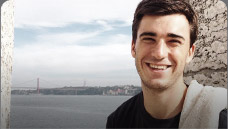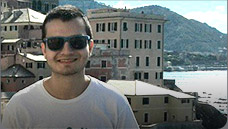AN ALUMNI REMEMBERS HOW SURO SHAPED HIM
What do I think when saying “Step Up Reach Out (SURO)?” First of all, it is a...
- G.MKT.HEM.05.2018.0218

AN ALUMNI REMEMBERS HOW SURO SHAPED HIM
What do I think when saying “Step Up Reach Out (SURO)?” First of all, it is a chance. A chance to do something right for yourself and your community.
When now, a few years later, I look back at my involvement in the SURO program, I understood that it was a great experience for me. The first huge advantage of this program is that it allows you to acquire skills of a great importance for both professional and everyday life, which are not easily reachable in another way. Learning about stakeholders in the haemophilia community, communication with them, working on developing your own project and many other aspects of the program – all of these activities are of paramount importance for the individuals who were lucky to be a part of this small family. Each of us in that group brought some advantages in comparison to others which came to the expression within those few days of work and that exchange of knowledge and skills was mutually beneficial. These processes were supported through great mentors who guided the program. It was one big step forward to further work within my community.
Connecting with blood brothers from other parts of the World I found as one of the tipping point in my life. Working and cooperating with other people with different background but the same challenges enables a wider perspective on the world. Something that is not easily achieved by just working within one community. I got the chance to meet people from many different countries, some of them are much ahead from Serbia, with much better health standards, while some others were coming from the lower rankings. SURO allows you to connect to a global haemophilia community which provides you to see and learn how other people live and face their problems by learning about their experiences – both positive and negative one. After participating you come back to your country with a richer and global mindset.
Last but not least, there is an informal side to the SURO program, which deserves to be mentioned. Through SURO I gained many new friendships. With some of the participants, I am in very close contact and those friendships will remain forever.
Every person has certain events that he or she remembers, which mean a lot to them. For me, Step Up Reach Out is one of those memories.











